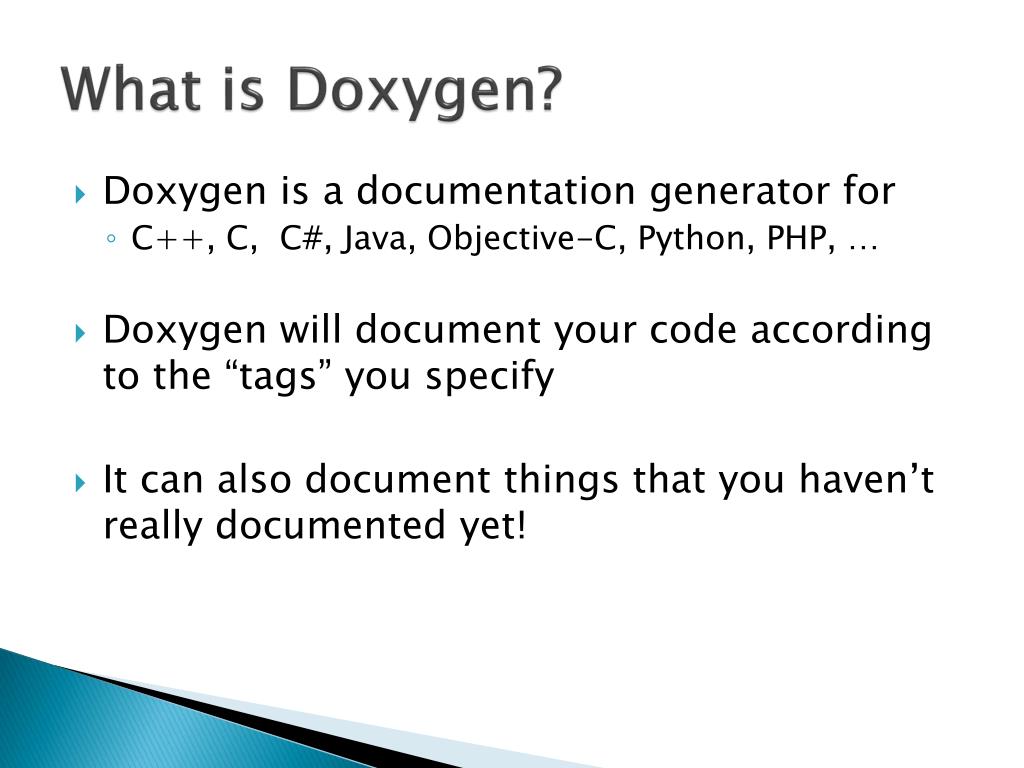
This is further detailed in the next section.
#Doxygen python how to#
How to put comments in your code such that doxygen incorporates them in the documentation it generates.Getting fftw into avionics is a tall order, for example. Sometimes small code can also be audited and tested easier and that figures in getting some industry certifications. It is probably not very environmentally conscious (I’m not kidding) to have such low performance in projects that get very wide use, because all that can quickly add to wasted megawatts on not too big of a scale, and probably mobile users would hate you for that too, but not everyone runs such code on server farms of inside mobile apps.

It all depends how much work you have to do each “frame”/“packet”/“time quantum”. Heck, if you can live with 20% performance of so, Python with numpy might just cut it for you. If you can afford to blow off some computational steam and run at 1/4-1/2 speed compared to fftw or blas, then a plain-C++ implementation might do just fine, and in a real-time setting.
#Doxygen python full#
So, if your needs are to extract close to full platform performance, you’ll need to use the specialized libraries. I have found that a lot of times just rather straightforward autovectorized C++ can get anywhere between 25-75% of performance of those beasts of libraries, if you have some background in the specifics of the platform and know what code patterns to use in C++, as there are ways to write simple C++ that can preform abysmally, and similarly simple C++ to do the same thing, just as intuitively, and it performs great. It’s not always the case of course, but quite often it is.

I have a little personal anecdote to offer here: a lot of the libraries you refer to are optimized to extract full hardware performance, and often there’s nothing one can do to make them any faster on a given CPU family. And usually people learn them instead of complaining that it's too much work to use/learn them. You need to use libraries or your project will be mostly useless, there's just too many libraries that are amazing in C++ (fftw, it++, openCV, eigen. People use those because they are fast and optimized and yours will be slow and clunky. The project is gigantic and it's going to be impossible for you to beat any of the existing C++ libraries. C++ still beats any scripting language or wrappers by a lot.Īnd even though i think it is a great idea and it might help some people, i think your approach is not ideal. Because even though it seems we live in an age with too much computing power that doesn't hold up for anything that needs to happen in what is basically real time. That's also why i usually don't recommend people on my field (signal processing and communications) to use python. It's nice, i had the same struggle and my decision was to just not use python anymore for work because i had to redo it in C++ anyway. If you need more complex routines then Blaze and Eigen will definitely be better options for you.Ĩ) Some more image processing routines for threshold generation and application, pixel clustering, cluster centroiding, etc. Some of the extra things included in NumCpp are:ġ) A Rotations namespace with Quaternion and Direction Cosine classes.Ģ) A Coordinates namespace for converting to/from cartesian/spherical and other corresponding operations.ģ) 1D and 2D signal/image processing filtersĤ) A random number module (basically wraps the boost random module)ĥ) Easy to use timer with simple tic()/toc() interfaceĦ) All of the NumPy array methods for operating on arraysħ) Some very basic linear algebra support (determinant, matrix hat operator, inverse, least squares, SVD, matrix power, and multi-dot product). Also, Blaze and Eigen are more for straight up linear algebra, while NumPy contains much more.

My intentions were a library that was as close to a one to one clone of NumPy for fast easy conversion to C++.


 0 kommentar(er)
0 kommentar(er)
